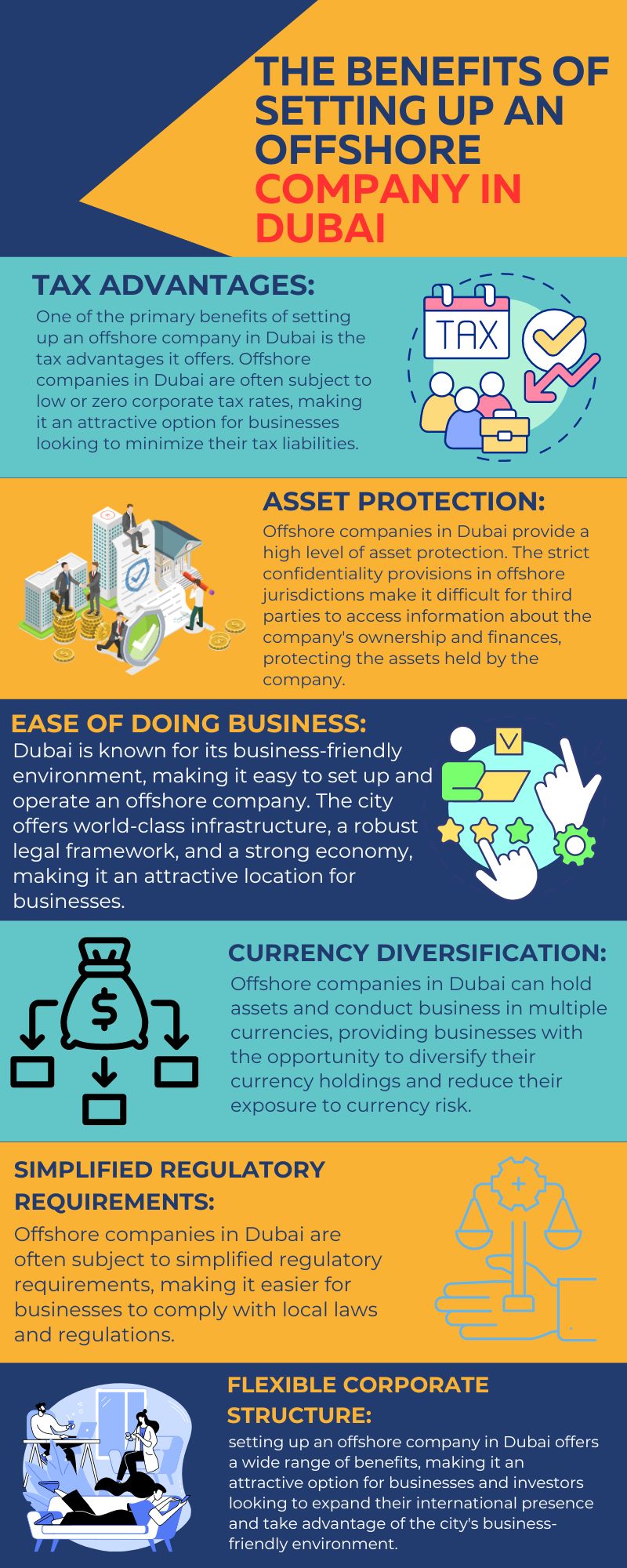Offshore Company Setup In Dubai: 2024 Guide
Are you considering setting up an offshore company in Dubai but feeling confused by the process? You’re not alone. Navigating the complexities of offshore company setup in Dubai can be daunting. But fear not as this guide is here to simplify the process for you.
We understand the challenges you might face, from legal requirements to administrative hurdles. This article is your comprehensive resource, designed to provide you with step-by-step guidance and valuable insights.
So, let’s get started.
Understanding Offshore Company
An offshore company is a legal business entity that is set up in a jurisdiction different from the one where the company’s operations are conducted or where its owners reside. Offshore companies are often established in jurisdictions that offer favorable tax regulations, privacy laws, and business-friendly environments.

One of the primary reasons for setting up an offshore company is to take advantage of tax benefits. Many offshore jurisdictions offer low or zero tax rates on corporate profits, dividends, and capital gains, making them attractive for businesses seeking to minimize their tax liabilities.
In addition to tax benefits, offshore companies also offer enhanced privacy and asset protection. The laws in offshore jurisdictions often provide strict confidentiality provisions, making it difficult for third parties to access information about the company’s ownership and finances.
Offshore companies can engage in a wide range of business activities, including international trade, investment, and holding assets. However, they are typically prohibited from conducting business within the jurisdiction where they are registered.
Overall, offshore companies can be a valuable tool for individuals and businesses looking to optimize their tax planning, protect their assets, and operate internationally.
Also Read: How To Move To Dubai: Ultimate Guide For UK Citizens
And as you know, Dubai is the tex friendly place to have an offshore company, everyone is curious to know how they can set it up.
Let’s discuss this in detail.
Setting Up An Offshore Company In Dubai
Dubai is known for its business-friendly environment, making it an attractive location for setting up an offshore company.
So, here is the step by step guide that will help you.
Step #1: Choosing The Right Jurisdiction:
When setting up an offshore company in Dubai, selecting the right jurisdiction is crucial. Dubai offers several offshore jurisdictions, each with its unique set of regulations and benefits.

Factors such as tax incentives, the legal framework, business infrastructure, and accessibility to markets should be considered.
For example, the Jebel Ali Free Zone (JAFZA) and the Ras Al Khaimah Economic Zone (RAKEZ) are popular choices due to their favorable business environment and infrastructure.
Evaluating the reputation and stability of the jurisdiction is essential, as it can impact the long-term success and operations of your offshore company.
Step #2: Selecting A Business Name:
Choosing an appropriate business name is a critical step in setting up an offshore company in Dubai. The name must comply with the naming guidelines of the chosen jurisdiction, ensuring it is unique and not already registered.
Conducting a thorough search to check the availability of the desired name is essential.
Once the name is approved, it should be reserved to prevent others from using it before the registration process is completed.
Step #3: Appointing A Registered Agent:
An offshore company in Dubai must have a registered agent who acts as a liaison between the company and the government. The registered agent can be an individual or a registered company in Dubai with a valid license.
Their role includes handling official communications, legal documents, and other administrative tasks on behalf of the company.
Choosing a reliable and experienced registered agent is crucial to ensure smooth operations and compliance with regulations.
Step #4: Submitting Required Documents:
Preparing and submitting the necessary documents is a key step in the setup process. This typically includes drafting the memorandum and articles of association, which outline the company’s structure, objectives, and operational guidelines.

Additionally, passport copies of all shareholders and directors, along with proof of their residential address, are required. Depending on the jurisdiction, a board resolution authorizing the setup of the offshore company may also be necessary.
Step #5: Obtaining Licenses And Permits:
Identifying and obtaining the required licenses and permits for your business activities is essential. This may include trading, consulting, industrial, or professional licenses, depending on the nature of your business.
Some jurisdictions offer license packages that cover multiple activities, simplifying the process for offshore companies. It is important to comply with all licensing requirements to operate legally in Dubai.
Step #6: Opening A Bank Account:
Choosing the right bank and opening a corporate bank account is an important step in managing your company’s finances. Selecting a bank in Dubai that offers services for offshore companies and meets your business needs is essential.
Providing the bank with the necessary documents, including your company registration documents, passport copies, and proof of address for shareholders and directors, is necessary to open the account.
Once the account is opened, you can start managing your company’s finances and transactions.
Step #7: Complying With Reporting Requirements:
Maintaining accurate financial records and complying with the reporting requirements of the jurisdiction where your offshore company is registered is essential.
This may include filing annual reports, maintaining financial records, and conducting audits as per the jurisdiction’s regulations. Failure to comply with reporting requirements may lead to penalties or the revocation of your company’s license.
Ensuring compliance with these requirements is essential for the smooth operation of your offshore company.
Step #8: Seeking Professional Assistance:
Given the complexities involved in setting up an offshore company in Dubai, seeking professional assistance is highly recommended.

Hiring a legal or financial advisor with expertise in offshore company setup can help you navigate the legal requirements, ensure compliance with regulations, and optimize your tax planning strategies.
They can also provide ongoing support and advice to help you operate your offshore company effectively.
By following these detailed steps and seeking professional assistance, you can successfully set up an offshore company in Dubai and take advantage of its business-friendly environment.
The Benefits Of Setting Up An Offshore Company In Dubai
Now you know the process of setting up offshore compnay in Dubai. But do you know the benefits?
Let’s discuss them in detail.

· Tax Advantages:
One of the primary benefits of setting up an offshore company in Dubai is the tax advantages it offers. Offshore companies in Dubai are often subject to low or zero corporate tax rates, making it an attractive option for businesses looking to minimize their tax liabilities.
· Asset Protection:
Offshore companies in Dubai provide a high level of asset protection. The strict confidentiality provisions in offshore jurisdictions make it difficult for third parties to access information about the company’s ownership and finances, protecting the assets held by the company.
Also Read: Why Dubai Is The Perfect Destination For Expanding Your Business?
· Privacy:
Offshore companies in Dubai offer enhanced privacy for business owners and investors. The laws in offshore jurisdictions often provide strict confidentiality provisions, ensuring that the details of the company’s ownership and finances remain private and confidential.
· Ease Of Doing Business:
Dubai is known for its business-friendly environment, making it easy to set up and operate an offshore company. The city offers world-class infrastructure, a robust legal framework, and a strong economy, making it an attractive location for businesses.
· Currency Diversification:
Offshore companies in Dubai can hold assets and conduct business in multiple currencies, providing businesses with the opportunity to diversify their currency holdings and reduce their exposure to currency risk.
· Simplified Regulatory Requirements:
Offshore companies in Dubai are often subject to simplified regulatory requirements, making it easier for businesses to comply with local laws and regulations.
· Flexible Corporate Structure:
Offshore companies in Dubai offer a flexible corporate structure, allowing businesses to tailor their corporate structure to meet their specific needs and objectives.
Overall, setting up an offshore company in Dubai offers a wide range of benefits, making it an attractive option for businesses and investors looking to expand their international presence and take advantage of the city’s business-friendly environment.
The Drawbacks
Besides the benefits, there are also some drawbacks that you must know in order to make an informed decision.
They are:
· Initial Setup Costs:
Setting up an offshore company in Dubai can be costly, with expenses such as registration fees, legal fees, and ongoing maintenance costs. These costs can vary depending on the jurisdiction and the services required.
· Perception Of Tax Avoidance:
Setting up an offshore company in Dubai may be perceived as a strategy for tax avoidance, which can lead to scrutiny from tax authorities in other jurisdictions. It’s important to ensure that the offshore company is set up for legitimate business purposes and complies with all relevant tax laws.

· Limited Access To Banking Services:
Offshore companies in Dubai may face challenges in accessing banking services, as some banks may be hesitant to work with offshore entities due to regulatory concerns. This can make it difficult to manage finances and conduct business transactions.
· Reputation Risk:
Setting up an offshore company in Dubai may carry a reputation risk, as offshore companies are sometimes associated with illegal activities such as money laundering and tax evasion. It’s important to maintain transparency and ensure that the offshore company is used for legitimate business purposes.
Understanding these drawbacks is essential for making an informed decision about whether setting up an offshore company in Dubai is the right choice for your business.
Also Read: The Ultimate Guide To Starting A Business In Dubai: Everything You Need To Know
Final Words
So that’s all you need to know about setting up an offshore company in Dubai. However, it’s important to weigh these benefits against the drawbacks, such as initial setup costs, ongoing compliance requirements, and reputation risks.
And with the right planning and guidance, you can set up and operate an offshore company in Dubai successfully.




